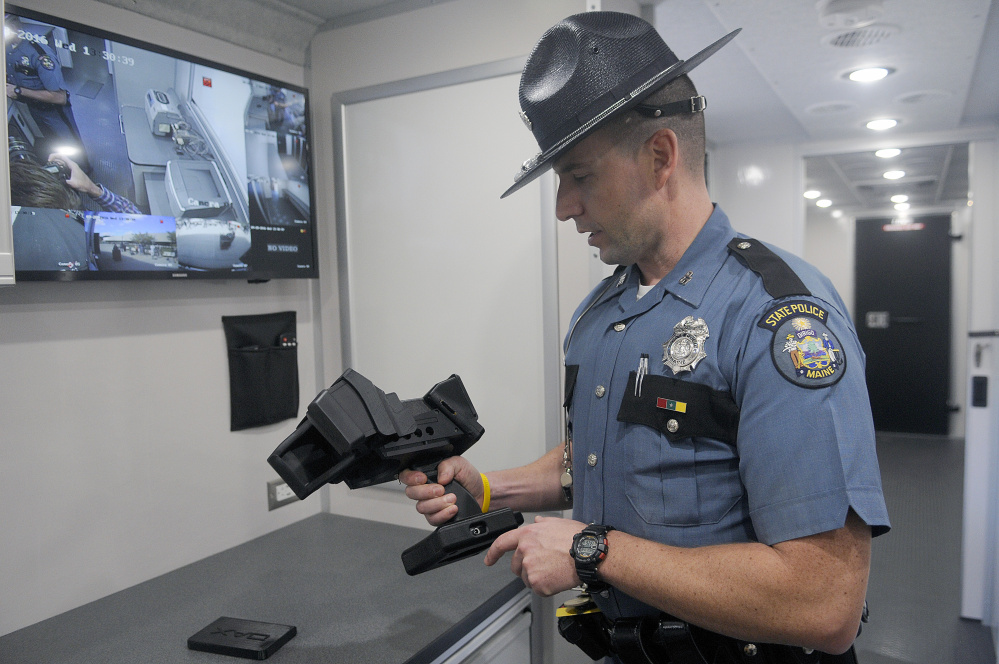AUGUSTA — State and federal public safety officials unveiled a vehicle Wednesday that’s designed to make roadside testing of drivers suspected of impaired driving safer, faster and easier for law enforcement agencies.
The 37-foot truck, bought using a nearly $300,000 grant from the National Highway Traffic Safety Administration, is going to give “all police departments and law enforcement a great opportunity to help defeat impaired driving,” Department of Public Safety Commissioner John Morris said at a news conference at the Maine Bureau of Highway Safety.
“There’s a lot of people dying because drivers are impaired,” Morris said. “This rig has everything officers need to enforce the impaired driving rules in the state, and it’s very exciting and will hopefully be very successful.”
Morris said 34 percent of all highway fatalities involve drivers with a blood-alcohol content at or above the legal limit of 0.08 percent.
“(State officials) have taken the time to make sure this vehicle is fully equipped … to remove the greatest number of impaired drivers, while also taking into account officers’ safety,” said Gabriel Cano, deputy regional administrator for the NHTSA. “It’s one of the things we’re very concerned about.”
The hulking vehicle is emblazoned with “Drive Sober, Maine!” and images of an alcoholic drink, car keys, handcuffs, pills and a marijuana leaf. It holds an Intoxilyzer 8000 device that tests breath for alcohol level, and an area where officers – including those with the training to recognize impairment in drivers under the influence of drugs other than, or in addition to, alcohol – can conduct field sobriety tests such as the “walk-and-turn.” Cameras are mounted on each side of that area to accurately capture tests that may end up being viewed by a jury.
Law enforcement agencies can request the vehicle on any given night, and barring any scheduling conflicts, the vehicle will be dispatched to an impaired-driving checkpoint. Officials hope it will be used every night.
The Maine State Police, the Kennebec County Sheriff’s Office and Augusta police planned to be the first agencies to take the vehicle for a spin. They were scheduled to conduct a joint operation Wednesday night in Kennebec County.
Augusta police Lt. Kevin Lully said the vehicle will be a tremendous asset to his and other departments across Maine. His department already has a device to test blood-alcohol level, so Lully doesn’t expect to use the vehicle consistently, but he touted its merits.
“It’s a phenomenal piece of equipment,” Lully said. “This allows us to work in conjunction with these other agencies and allows for better roadside investigation.”
Lully said the vehicle will make conducting investigations during snowy, icy conditions safer and easier.
“We can do those investigations without compromising a person’s ability to perform the tests based on the road conditions,” he said. “We can bring them inside and everything can be done right there in a controlled atmosphere.”
State officials have been working on the project for a number of years and are happy to see it come to fruition, said Lauren Stewart, director of the Bureau of Highway Safety.
Having the vehicle on scene provides a number of advantages to law enforcement, officials said. Some departments have to drive people suspected of driving while intoxicated more than 45 minutes before administering a blood-alcohol test, and often that person’s blood-alcohol level has decreased enough to straddle the line between intoxicated and not intoxicated.
“I couldn’t imagine being stationed somewhere on the interstate or on a country road with poor lighting, doing roadside tests all by myself,” Lully said. “This probably has more lights than my entire fleet, and everything can be done within the confines of a safe zone.”
Lully said this type of vehicle will help because officers aren’t just looking for drivers who are under the influence of alcohol, and more and more drivers are being found to be under the influence of drugs, especially opioids.
While noting the large marijuana leaf on the side of the vehicle, Morris said his fear is that law enforcement will be “facing a real issue here with impaired driving.”
Legalization of marijuana for personal use is on the ballot in November, and there is no blood-test threshold that can reliably determine marijuana impairment.
Send questions/comments to the editors.



Success. Please wait for the page to reload. If the page does not reload within 5 seconds, please refresh the page.
Enter your email and password to access comments.
Hi, to comment on stories you must . This profile is in addition to your subscription and website login.
Already have a commenting profile? .
Invalid username/password.
Please check your email to confirm and complete your registration.
Only subscribers are eligible to post comments. Please subscribe or login first for digital access. Here’s why.
Use the form below to reset your password. When you've submitted your account email, we will send an email with a reset code.